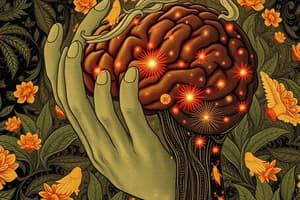Podcast
Questions and Answers
What is the memory code formed for interpretation during the encoding process based on appearance, sound, or meaning?
What is the memory code formed for interpretation during the encoding process based on appearance, sound, or meaning?
- Memory
- Retrieve
- Encode (correct)
- Store
What is the process of encoding, storing, and retrieving information called?
What is the process of encoding, storing, and retrieving information called?
Memory
What term describes the amount of information the brain can store in its memory?
What term describes the amount of information the brain can store in its memory?
Capacity
What type of memory store retains sight and sound stimuli for a fraction of a second?
What type of memory store retains sight and sound stimuli for a fraction of a second?
What part of sensory memory retains auditory information?
What part of sensory memory retains auditory information?
What part of sensory memory retains visual information?
What part of sensory memory retains visual information?
How long can short-term memory retain unrehearsed information?
How long can short-term memory retain unrehearsed information?
What type of memory store holds an unlimited amount of information for a long period of time?
What type of memory store holds an unlimited amount of information for a long period of time?
What type of long-term memory is specific to facts and events?
What type of long-term memory is specific to facts and events?
What type of long-term memory is specific to procedures and conditioned responses?
What type of long-term memory is specific to procedures and conditioned responses?
What is the second step in the brain's memory process?
What is the second step in the brain's memory process?
What are the three types of memory stores?
What are the three types of memory stores?
What is the third step in the brain's memory process?
What is the third step in the brain's memory process?
Where does memory formation primarily occur in the brain?
Where does memory formation primarily occur in the brain?
What type of memory depends on the similarity of the situation or environment during encoding and retrieval?
What type of memory depends on the similarity of the situation or environment during encoding and retrieval?
What type of memory relies on the similarity of mood at encoding and retrieval?
What type of memory relies on the similarity of mood at encoding and retrieval?
What is the memory process of accessing information from the past called?
What is the memory process of accessing information from the past called?
Memory depends on the __________.
Memory depends on the __________.
Who studied sensory memory and discovered that memory holds fleeting photographic images?
Who studied sensory memory and discovered that memory holds fleeting photographic images?
What influences short-term memory capacity?
What influences short-term memory capacity?
What is the title of George Miller's famous paper discussing memory limits?
What is the title of George Miller's famous paper discussing memory limits?
What is an alternative name for short-term memory proposed by Alan Baddeley?
What is an alternative name for short-term memory proposed by Alan Baddeley?
How many components did Alan Baddeley propose short-term memory has?
How many components did Alan Baddeley propose short-term memory has?
An example of an echoic memory is __________.
An example of an echoic memory is __________.
What type of memory consists of memories of specific personal events?
What type of memory consists of memories of specific personal events?
What type of memory includes memories of general meanings and information?
What type of memory includes memories of general meanings and information?
Flashcards are hidden until you start studying
Study Notes
Memory Concepts
- Encode: Memory code developed during encoding, influenced by appearance, sound, and meaning.
- Memory: Comprises the processes of encoding, storing, and retrieving information.
- Capacity: Refers to the volume of information the brain can store in memory.
Memory Types
-
Sensory Memory: Retains sight and sound stimuli for fractions of a second with a large capacity, divided into:
- Iconic Memory: Visual stimuli retention.
- Echoic Memory: Auditory information retention lasting 2-4 seconds.
-
Short-Term Memory: Holds unrehearsed information for 10-20 seconds, limited to 5-9 items, maintained through rehearsal.
-
Long-Term Memory: Unlimited storage for lengthy periods.
Long-Term Memory Types
- Explicit Memory: Involves recall of facts and events.
- Implicit Memory: Relates to procedural knowledge and conditioned responses.
Memory Processes
- Storing: Second step in memory process, analogous to a computer hard drive.
- Retrieving: Third stage where information is accessed, similar to opening a saved file.
Brain Structures Related to Memory
- Involves the Prefrontal Cortex, Parietal Lobe, and Hippocampus, part of the medial temporal lobe memory system for various memory types.
Memory Retrieval Influences
- Context-Dependent Memories: Retrieval is aided when the environment during encoding mirrors that during recall (e.g., retracing steps).
- Mood-Dependent Memories: Retrieval is enhanced when present mood matches mood at encoding (e.g., recalling arguments).
Research and Theories
- George Sperling (1960): Studied sensory memory, revealing that the brain retains fleeting photographic images for about 0.5 seconds.
- George Miller: Proposed the limit of memory items is seven (±2) in his 1956 paper "The Magical Number Seven, Plus or Minus Two."
- Alan Baddeley: Developed the working memory concept, encompassing four components:
- Central Executive
- Phonological Loop
- Visuospatial Sketchpad
- Episodic Buffer
Memory Components and Examples
- Episodic Memory: Personal event memories (e.g., weddings).
- Semantic Memory: General knowledge and meanings (e.g., continents).
Key Examples of Memory Types
- An echoic memory example: Thunderclap during a thunderstorm.
- Short-term memory capacity relates to attention control and is associated with reasoning, reading comprehension, and intelligence.
Studying That Suits You
Use AI to generate personalized quizzes and flashcards to suit your learning preferences.




